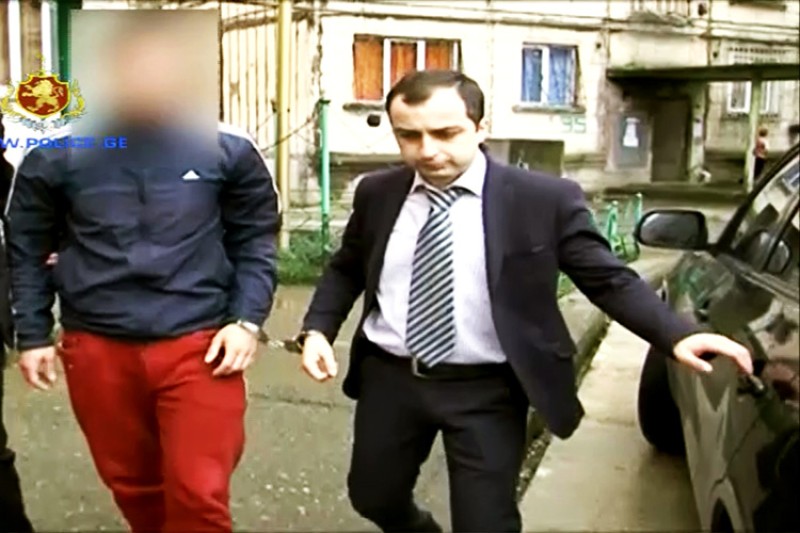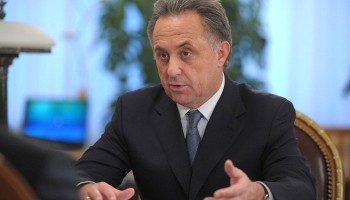Francesko Baranca, the general secretary for the non-profit sports gambling watchdog FederBet in Brussels, doesn't mince words.
“To be honest, Georgian football is considered very bad,” he told OCCRP partner iFact.ge while in Tbilisi for the Georgia Gaming Congress. “Not many bookmakers offer odds for them, and when they do, you can see very strange (betting) movements.
“According to the numbers, I can say Georgia is near the bottom for betting safety. It means there are many opportunities for cheating, for fixing matches.”
The money can be significant. In the middle of one unimportant Second Division match, someone placed a US$95,000 bet that more than 2.5 goals would be scored. When that huge bet lowered the odds, a second group of gamblers raised the bribe amount while the game was underway, betting that fewer than 2.5 goals would be scored. The second group won when the final score was 2-0.
According to betting fraud detection data compiled by the Union of European Football Associations (UEFA), five Georgian matches were allegedly manipulated in a five-week period near the end of the 2016 season.
One fixing case has been inching its way through the Georgian court system for the past two years. Key testimony comes from Giorgi Ghelaghutashvili, a Georgian Anti-Corruption Agency operative who went undercover in search of match fixers.
In his testimony, Ghelaghutashvili describes one meeting with footballers from a tiny rural club: “We met several players in a flat. They assured us that if we could agree on payment, they were ready to create any result we wanted. They said that to achieve the desired result, they were even ready to score goals against themselves,” meaning they would kick the ball into their own net.
The undercover agent said he began his investigation by meeting up with a former football coach he knew. The agent told the coach he had a friend who was playing football abroad who wanted to come home. The coach arranged for a former Georgian player, David Gendzekhadze, to set up a tryout for the overseas player.
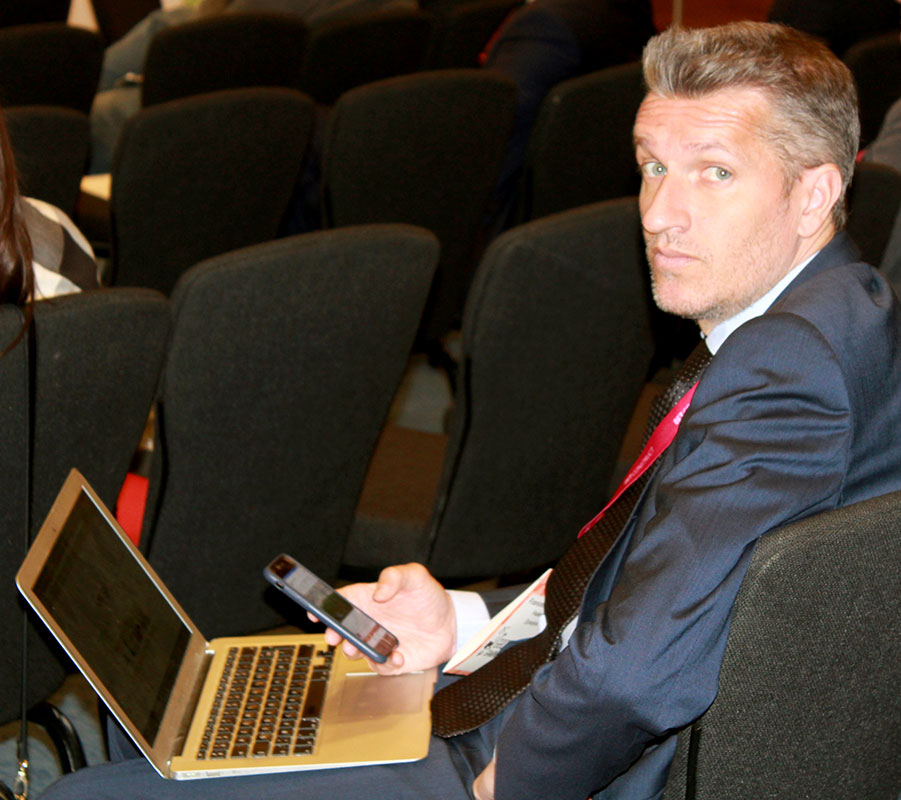
The agent said Gendzekhadze introduced him to several men who were later charged with gambling crimes. According to the Anti-Corruption Agency, “the investigation established that the arrested persons, in exchange for money which varied from 10,000 to 20,000 lari (about $4,400 to $8,800) made pre-agreements with different teams to achieve the desired results. Then, based on the information received in advance, they made bets via online bookmaking websites and shared the money they won.”
Eight men were arrested in connection with the scheme, including STU Tbilisi club president Otar Shengelia; two players from the rural club Kharagauli Chkerimela; two from the Sachkere Chikhura club, Gendzekhadze (an official) and a club player; a former player for the Kutaisi Torpedo club; and two other men who allegedly participated in the bribery. If convicted, they could face from four to six years in prison.
Sports gambling watchdogs say that as much as 80 percent of the money wagered on football matches worldwide comes from Asia, and that match fixers often focus on poorly paid Second Division teams from small countries.
The court case materials obtained by iFact.ge include secretly recorded audio and video tapes and more than 3,000 pages of documents. The undercover agent testified about negotiations with STU Tbilisi president Shengelia.
“Shengelia told me that he spoke with officials of FC Chkherimela and they agreed to fix the match for 10,000 lari (about $4,400),” Ghelaghutashvili testified. “However, they hadn’t decided the exact bet, whether there should be 5 or 6 goals scored, etc. Maybe more fix money would be needed.
“I told Shengelia that if 5 goals were scored I would pay 15,000 lari (about $6,667); if 6, I would pay 16,000 lari (about $7,110). If his team would just win the game by any score I would pay 12,000 lari (about $5,330), and if his team would score goals in both the first half and second half, I would pay 14,000 lari (about $6,222).
“Shengelia agreed and told me that one hour before the match he would call and tell me which result to bet on. He told me that if 6 goals were to be scored, he would tell me 'the dinner table will be ready at 6 o’clock'. If 5 goals were to be scored, he would tell me 'the table will be ready at 5 o’clock'. If his team would score most in both halves, he would say 'the table will be ready at 2 o’clock'. If his team would simply win the match by any score, he would say 'the table will be ready at 1 o’clock'.
“Shengelia called me 30 minutes before the match and told me 'the table will be ready at 1 o’clock'. That meant that the final agreement with FC Chkherimela had been reached and STU Tbilisi would simply win the match. " STU Tbilisi won, 3-0.
The undercover agent later met Shengelia and gave him the money. Davit Modebadze, Shengelia’s lawyer, confirms his client took the money, but argues that while “probably this action is not justified from a moral point of view,” his team was supposed to try to win the match and did, so no crime was committed. The prosecutor disagrees.
Eight Referees Arrested
Allegedly Fixed and Suspicious Matches
The following information was compiled from court testimony and reports of the Georgian Football Federation investigating allegations of match fixing between 2014 and 2016.
On Dec. 4, 2014, undercover agent Giorgi Ghelaghutashvili, former Georgian player David Gendzekhadze, and gamblers Giorgi Kukhalashvili and Ioseb Gioshvili met in a Tbilisi apartment. “A couple of minutes before the match began, I was told that five or more goals will be scored,” Ghelaghutashvili testified.
Modebadze formerly represented Tornike Gvantseladze, a top Georgian referee certified by FIFA, the world soccer body. In September 2014, Gvantseladze was arrested for allegedly telling an undercover agent that he would ensure there would be more than five sideline throw-ins during a match and that the agent could bet on it.
The lawyer said that Georgian football officials examined Gvantseladze's match tape and saw no problems with 7 sideline throw-ins.
Seven other referees were also arrested. According to a statement from the Anti-Corruption Agency: “an investigation established that (those arrested) made agreements with people in advance on the number of red and yellow cards to be shown during a match, in return for cash ($2,500 to $5,000).” Bettors with this knowledge used it to win money.
Some game officials may take bribes because they are paid so little. In an interview with the sports website sportall.ge, convicted referee Otar Khutadze said that in 2014, referees for Second Division matches were paid about $66 and linesmen and goal judges received about $44 per game.
The referees were convicted of illegally acquiring money in as a criminal group. The sentence for that crime is four to six years, but all the referees were pardoned either by the national Parole Authority or by the President of Georgia.
Fast postponement
In November 2015, a match between FC Kolkheti Khobi and FC Liakhvi Tskhinvali was postponed at the last minute. One of the Liakhvi players had received a phone call offering him money to fix the match. He immediately informed club authorities, who contacted the Georgian Football Federation.
Just a month earlier, the federation had elected a new president: Levan Kobiashvili, a former Georgian national star, who had returned to his country after playing top division Bundesliga football in Germany.
On match day, Kobiashvili arrived in the small western Georgia town of Khobi.
“There was information that something was happening there, or at least somebody was trying something,” Kobiashvili said. “I traveled there because I wanted to hear from the player himself what had happened.
“I spoke with him and he told me there was some kind of offer. I decided to postpone the game because I thought there was a threat. It was a difficult decision. Clearly, the Football Federation will not be able to postpone matches after every such call.”
Kobiashvili says he was never approached to fix any of the more than 400 matches he played in Germany. Of course, as a Bundesliga player, Kobiashvili was very well paid.
Not so the Georgian players. According to one of the arrested players: “After I made the team, the club management gave me a bank ATM card for my salary. The wage was 500 lari (about $222) per month. But I only got my salary three times in five months.”
'Sometimes During The Match'
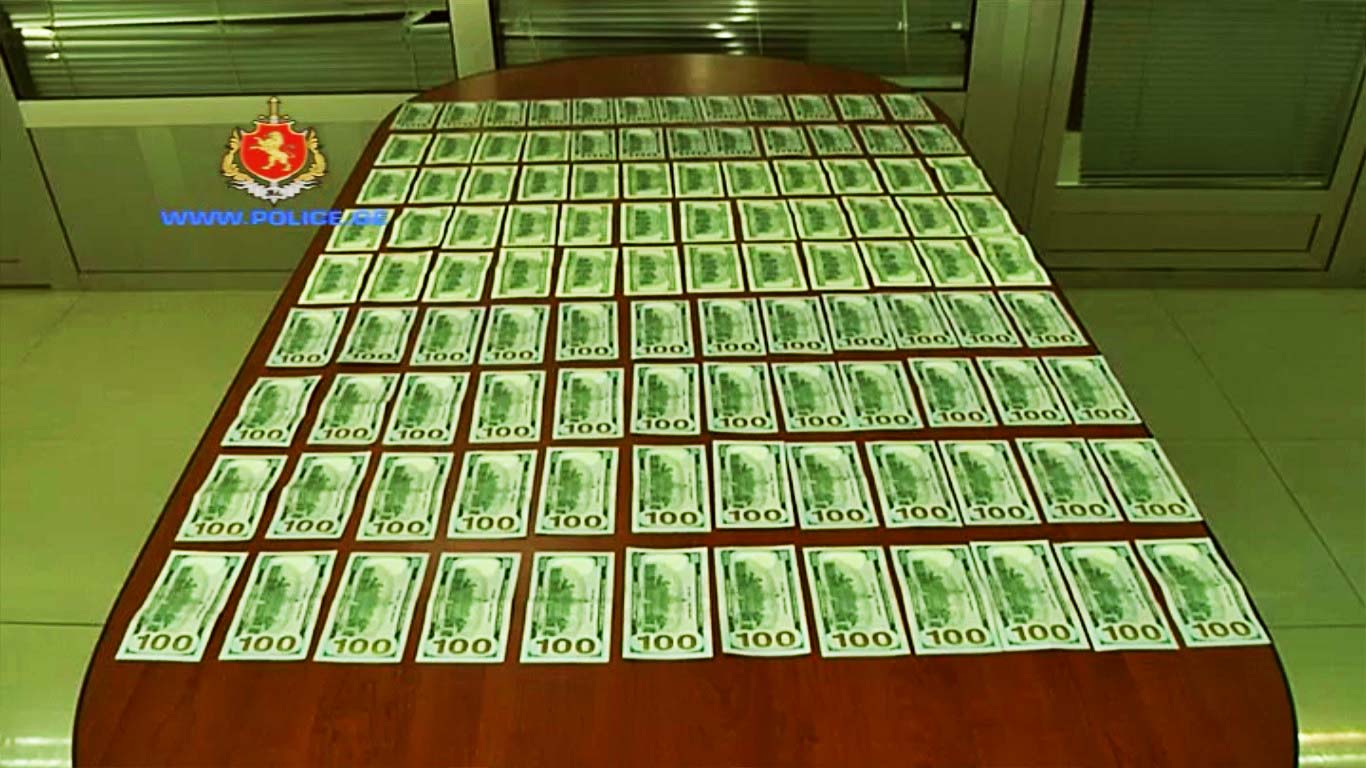 Georgian police officials show cash seized from alleged match fixers. The Georgian Football Federation signed a memorandum of cooperation with the Ministry of Internal Affairs to investigate match fixing. The federation also created a new unit in 2016 called the Division of Sport Fairness.
Georgian police officials show cash seized from alleged match fixers. The Georgian Football Federation signed a memorandum of cooperation with the Ministry of Internal Affairs to investigate match fixing. The federation also created a new unit in 2016 called the Division of Sport Fairness.
“We are not an investigative organization,” Kobiashvili says. “We will use whatever resources we have to uncover these crimes. But it is not a topic on which we can speak very publicly about how we do it.”
The Division of Sport Fairness was only two months old when it found its first case of match manipulation. After studying video of a match in which Kolkheti Khobi defeated Betlemi Qeda 4-1, the federation’s disciplinary committee banned four Betlemi players and an assistant manager for life; relegated the tiny club to Georgia’s lowest league; and fined it 50,000 lari (about $22,200).
A three-minute video clip of that match released by the federation show players from both teams mostly standing around. Finally, the Betlemi goalkeeper, instead of kicking the ball upfield, passes it slowly to a nearby teammate and then walks away from the goal area. There is one more pass to another Betlemi player, who then gently kicks it into his own empty net. On the video, the cynical laughter of the few fans in attendance can be heard.
Vakhtang Bzikadze is the head of the Division of Sports Fairness. “Sometimes the agreement is made before the match, sometimes during the match," he said. "We had one match where the referee told us that two players were arguing about who was supposed to score a goal. It was happening right on the field."
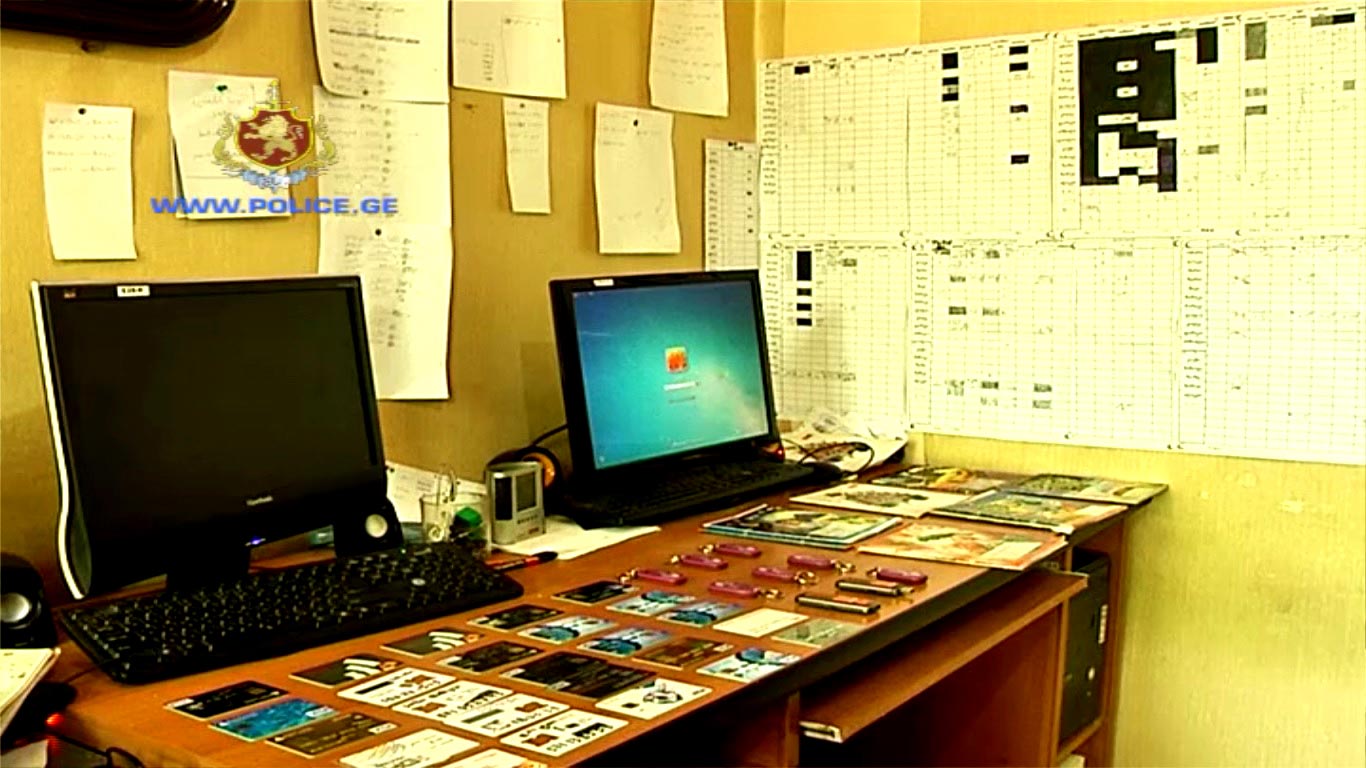 Omar Nakaidze, one of eight men on trial in connection with a Georgian football gambling ring, says he uses four computers in his Tbilisi apartment to place lightning-fast bets based on tiny differences in betting odds on football matches. He’s not guilty of gambling, he insists—he’s just good at math. If convicted, he faces up to six years in prison. (Photo courtesy of Georgian police)
Omar Nakaidze, one of eight men on trial in connection with a Georgian football gambling ring, says he uses four computers in his Tbilisi apartment to place lightning-fast bets based on tiny differences in betting odds on football matches. He’s not guilty of gambling, he insists—he’s just good at math. If convicted, he faces up to six years in prison. (Photo courtesy of Georgian police)
In response to written questions, UEFA replied:
“UEFA monitors all UEFA competition matches and the top two leagues in our 55 member associations (about 32,000 matches per season). In general terms, we do not give details on investigations unless a disciplinary case has been opened or a decision has officially been taken.”
Zoran Lakovic, Director of National Associations of UEFA, came to Tbilisi in March of 2017 for a UEFA Grow Summit. Match fixing, he said, “is not only in Georgia. You will find it in almost every country.
“This is an ongoing problem, because it is a big gambling market that we are facing, especially in Asia. I am from Serbia, and you can find a lot of matches that are being monitored by UEFA in Serbia, in Croatia, in Romania, in northern countries as well.
“It is not enough just to accuse the players, the clubs or the national federations. Federations cannot do intelligence work. This is the work of the police and also the government. We encourage the federations to share intelligence with them and to act according to UEFA standards.”
Baranca, from the betting watchdog FederBet, claims fixes are easy to spot:
“The betting market is like a stock market. For every possibility, there is a price. When someone is betting heavily because he has some information, the odds get crazy, the numbers are not real any more, and it means that we are witnessing …[the] possibility of match fixing.
“It may seem that monitoring a match is impossible. But it is very easy because there are computer programs that alert you that something is wrong. We have two systems. One is watching the global market, where we can see every bookmaker that offers odds. Plus we have direct information from the bookmakers affiliated with FederBet. They give us the names of bettors. With this data, we can go to the police.”
Baranca has a theory about why bookmakers accept bets from suspect countries like Georgia.
“A bookmaker accepts the risk of a fixed match because he is sure the gambler will lose that money and more betting on matches that aren't fixed. The big bookmakers in Asia -- what they lose on fixed matches is peanuts.”
